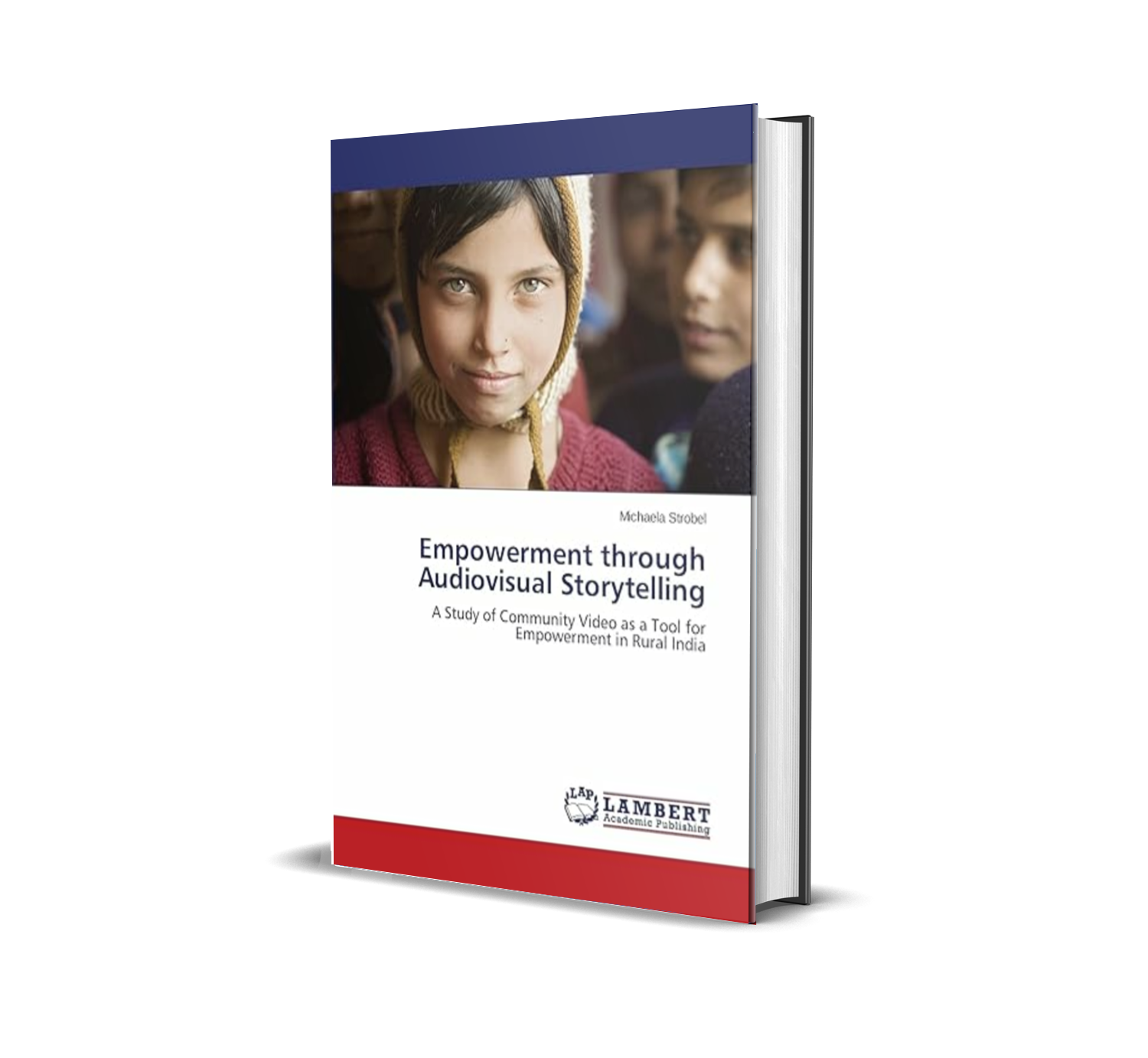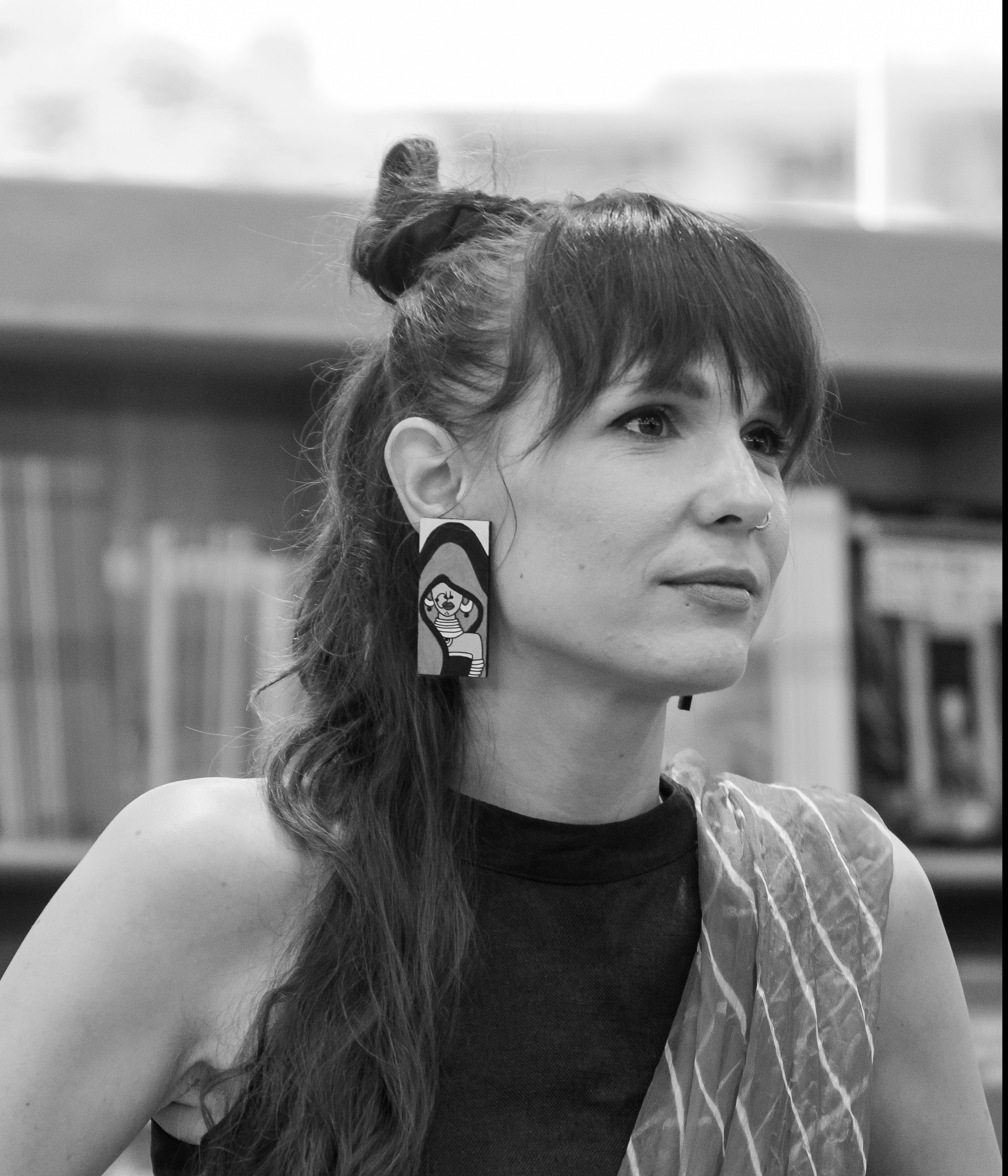Michaela Talwar is a trained journalist and multidisciplinary artist. She is the co-founder and creative director at Harkat Studios, a boutique arts studio and alternative performance space in Versova, Mumbai. As part of her work at Harkat, she is an arts enabler who has produced, curated, and facilitated over 400 theatre shows, film festivals, and exhibitions in various forms over the past five years. She also leads the creation of marketing video content for various film studios and OTT platforms like Netflix and Amazon where she produces viral videos, ads and title sequences, and poster designs. She has co-produced several short films, including And Sometimes, She Loved Me Too, (Love), the Ek Minute series, and directed various short-form content such as Intellectual Masturbation and Rajkumari Woke. In 2015 she published “Empowerment through Audiovisual Storytelling in Rural India”. A polyglot, she originally hails from Germany and has lived in many places, but nothing shaped her quite as much as Mumbai has.
In an exclusive interview with Nitish Raj; Editor-in-Chief, Today Magazine the veteran director talks about the various aspects of filmmaking and theatre.
Q.1: How challenging is it to switch from being a journalist to becoming a Creative Director in your career?
MT: For me, it was less "tough" than liberating. As a journalist, one is constantly pitching ideas and many of them never make it - even after having been produced. So, for me taking matters into my own hands was the only way out. Running my own agency allows me to create the stories I want, the way I want.
Q.2: How does Harkat Studios differentiate itself from other boutique arts Studios in our country?
MT: I don't think there is any studio comparable to Harkat. Because of the people it is run by - we are an agency run by an artist collective. So, all our commercial work is infused by our ever-evolving artistic sense - be it the materials or the thoughts that drive us at any given moment. In that sense, the evolution of Harkat Studios has also become gleefully unpredictable, often leaving us to be the outlier. We were the first to 'agency- fy' Behind-the-Scenes content when nobody really saw any monetary merit in it - since then the value and quality of that content across the industry has reached a whole new level with several players in the field.
When we started co-working in 2015, we were the only studio offering this kind of setup in the suburbs. And when we opened as a theatre space, it hit off a whole wave of performance spaces in Versova. But these were all decisions that don't make 'business' sense in a traditional sense. We are more driven by intuition, which can appear to be erratic at first, but we stick with it and make it work. Harkat is alive as much as the people who run it and like with any being, it's difficult to predict what's next.
With our passionate work with and for celluloid filmmaking, we have now become one of the last labs in India to be able to shoot, develop, and screen in almost all formats. We are working on refining our craft constantly and this has in turn influenced our 'digital" (not-so-digital) work for title sequences such as we did for "Trial by Fire" and "GunsNGulaabs" for example. These things are all driven by the passionate individuals at Harkat Studios, ever-evolving.
Q.3: How do you perceive the filmmaking process in India to differ from that in European countries?
MT: Very much. I struggled for a solid year until I came to terms with it first. The amount of people "required" on an Indian set still leaves me flabbergasted. I have so many thoughts on this, I don't even know where to start. As a result, our efforts at Harkat have always been to cut down the flab and concentrate on the narrative, so we usually work with what would be considered a 'minimal' crew in India. Of course, the big sets where our team goes to shoot BTS content are still big, but we found our niche and place in them and it's quite comfortable and enjoyable!
One thing that I appreciate about film sets, and people in general, here is 'jugaad'. It allows me to do things that would be unspeakable in the more rigid German workflow, and I am learning new ways of doing things almost every day from the people around me. It's made me become much more real-life solution-oriented and chilled out about minor hiccups.
Q.4: Having curated over 400 theatre shows, what recommendations would you offer to make theatre shows more profitable for artists, given that theatre artists receive relatively low pay?
MT: Funding from independent, reliable sources would make it so much easier. Luckily ticket prices are rather affordable in alternative spaces such as ours, so the accessibility is less of an issue, which is great. But that results in it almost being impossible to mount a profitable show. Internationally theatre is funded by many different players, private, public, and governmental on a regular, very reliable basis. And there are many checks and balances in place to assure that the funding is sort of politically detached (of course there is always a bias). Ideally, the government and public institutions could put a lot more money into the arts, but I feel that India which is so big and has larger and different issues to tend to than for example Germany, cannot allocate funds so easily. Art does rely a lot on philanthropy, which is not ideal. We try to change our circumstances by funding our arts engagement through our commercial work. So the best way to become sustainable is to not rely on the goodwill of others but to create a structure where the arts organization itself earns money to create more art.
Q.5: How much making of advertisements differ for OTTs as compared to TV channels?
MT: We make very few ads and have never made any ads for TV. We don't believe in selling people things they don't need and it's very hard to find companies who walk the talk of what they claim. But when we find a sincere product and company then we love to work in collaboration with the company in developing a script.
TV ads are a whole genre in themselves, where you must skilfully cut down milliseconds because they need to fit into the programming and obey the corporate identity of clients - that's not so much our jam, we prefer more free-flowing workflows.
Q.6: You had also authored a book titled, “Empowerment through Audiovisual Storytelling in Rural India”. What steps do we need to implement to connect Rural People to storytelling and theatre groups on a massive scale?
MT: The book was written pre-TikTok pre-Instagram at the scale it's currently at. The book concludes that there lies a lot of empowerment in the act of 'creating' something. And I think 'rural people' if they can be labeled so broadly, have taken matters pretty much in their own hands with popular channels from all corners of India highlighting their life and the issues they have. It's more about 'urban people' learning how to listen and engage in conversations on an equal level. Theatre is a great means to achieve this, and we had some groups from more remote parts of the country perform but would love to do more of that. However, travel and stay for these groups is often an issue and it would take several spaces across a city or even state to collaborate and fund together so that one group could travel to a bigger audience. But it's not like theatre spaces have any money left to fund such endeavors either.
Q.7: You have also one segment of Harkat Studios in Germany. How the studio in Germany is helping to enrich the arts environment in India?
MT: We mostly work on commercial projects based in Europe out of our studio in Germany. So, there's not as much of a physical space as the one here in Mumbai, but rather a small team that supports our commercial work.
Q.8: What are the upcoming projects of Harkat Studios?
MT: We have just published our first novel, that is me, Michaela Talwar, together with Aditi Mediratta who is a scriptwriter and an informal part of Harkat. It's titled "Naked" and was published by Om Books International in July this year. Aditi and I are currently working on more material from/for/by the book. Which should get readers and audiences excited in 2024.
We are also amid shooting our feature film, currently on floor in Delhi which is directed by my partner Karan Talwar. It's being shot on celluloid film and will be released next year. I'm also working on an analogue photo project which will be published by the end of November. And of course, we have our yearly "16mm Film Festival", now in its 5th edition which will take place from 15-17th December at Harkat and possibly other venues across Mumbai, where we showcase films from across the world which have been shot on film. We are also working on artworks and a curatorial around the book, Naked, which will be a walk-in exhibition.






